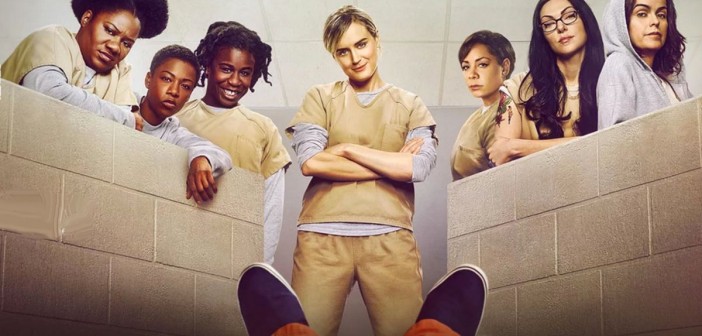The fourth season of Orange is the New Black, which will stream all of its 13 episodes on Netflix starting Friday, picks up the very instant that season three ended. Right after the credits roll we see all of the inmates splashing around in the lake on campus after the fence around the yard was removed, Voss (Laura Prepon) in a very precarious situation in the green house, Piper (Taylor Schilling) pretending to be a badass after sending her paramour Stella (Ruby Rose) to the maximum security wing of the prison, and hundreds of new inmates streaming into the facility now that it is run by a for-profit company.
Having a bit of continuous action might seem conventional for a television drama, but it’s actually a stroke of genius for this one. For all of us dedicated viewers who have been locked into this series since it began, we’ve waited a whole year for more installments. But Netflix is always playing the long game. Imagine someone just discovering this series now, or a year from now, or five years from now and watching all the addictive episodes in one chunk. They’ll go right from the end of season three into the beginning of season four like nothing even happened.
Netflix, essentially, is trying to do away with the conventions of the television season as we know it. In February the streaming service renewed Orange is the New Black for three additional seasons, keeping it on the air, presumably, through 2019. At that time, if this tactic continues, viewers will have 91 hours of a never-ending prison saga, where inmates come and go and return and go again, where guards are hired and fired, and where Piper never learns what a selfish jerk she really is.
This is a bit of a change for the series, with the first two seasons neatly packaged in a conventional way. The first season was mostly concerned with Piper acclimating to life in Litchfield and the second season was all about Vee (Lorraine Toussaint) inserting herself into the tentative ecosystem. These were conventional arcs that started and ended within the span of a season. But on Netflix, which is always thumbing its nose at linear television, that doesn’t matter any more.
Seasons three and four don’t bother with an overarching structure. They are imperceptibly different, with season three concerning itself more with religion and motherhood and season four focused on the overcrowding of the prison and its consequences (including heightened racial tension). However, if watching all the episodes in succession, the shift from one set of themes to another is so gradual and organic that as to be imperceptible.
This innovation is impressive if only because of the grandiosity of it, but it certainly doesn’t reward all of us who are tracking this epic in annual fits and starts. During episode one, it took me a while to even remember that Piper now runs a side business exporting inmates’ panties to fetishists in the outside world or that Sophia (Laverne Cox) was thrown into solitary confinement. Once I remembered that she was, I had a hard time remembering why. (For those in need of a refresher, it’s because she threatened to sue MCC, the company that runs the prison, for poor security after she was attacked by some transphobic inmates.)
Plenty of other details will slowly emerge naturally from the narrative, like Pennsatucky’s (Taryn Manning) rape by a guard, Poussey’s (Samira Wiley) burgeoning relationship with Soso (Kimiko Glenn), and Morello’s (Yael Stone) marriage to a real actual human man who she is not stalking. But without a “Previously on …” it takes a while for the fog of memory to burn off and to get fully immersed in this world again.
That said, it’s as immersive as ever especially now that the cast is so sprawling and there are so many well-defined characters. There aren’t many new ones introduced this season (thank God) and the show seems less and less concerned with the flashbacks to the inmates’ lives before they were locked up. The flashbacks seem to get shorter and shorter and the sixth episode doesn’t even have them at all.
Just because season four bleeds into season three doesn’t mean that there isn’t forward momentum or surprises in store for our favorite characters. Taystee (Danielle Brooks) gets a job as Caputo’s (Nick Sandow) personal assistant which leads to plenty of comedy and a little bit of intrigue. Newly converted Jew Black Cindy (Adrienne C Moore) is mixing it up with her new Muslim bunkmate. Voss and Lolly (Lori Petty) form a tentative partnership when they end up in hot water together. Judy King (Blair Brown) the combination of Martha Stewart and Paula Dean that was introduced at the end of season three when she surrendered herself to custody, gets a much-expanded role and has a very complicated relationship with some of the COs.
But the real focus is on the prison itself and all of the changes that are coming thanks to MCC and their penny-pinching ways. Viewers might think they’ve seen a lot of atrocities at the prison, but wait until there is a maxi pad shortage because of budget cuts. More inmates, fewer jobs, and fewer resources mean that even the toughest Litchfield vets are now living in a world they don’t entirely understand, and it’s a system that is built to take advantage of them even more than it did before. It might be hard to tell the differences between seasons three and four, but this is certainly a lot more grim but just as wonderful as the first time we were locked behind these bars.
Source: https://www.theguardian.com/tv-and-radio/2016/jun/15/orange-is-the-new-black-season-four-review

